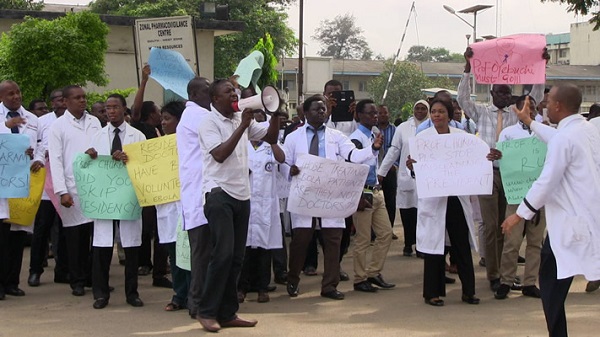
Health experts and civil society advocates have called for an independent investigation and urgent reforms at the Federal Medical Centre (FMC), Abuja, following the emergence of a viral video that allegedly captured staff negligence at the hospital’s accident and emergency unit.
The video, which has sparked national outrage and widespread criticism on social media, reportedly shows hospital personnel hesitating to assist an injured accident victim. Their alleged justification: a lack of gloves and insufficient manpower to safely transfer the victim from a car to a wheelchair.
Reacting swiftly, the Minister of State for Health and Social Welfare, Dr. Iziaq Salako directed a comprehensive investigation into the incident. In a related statement signed by the hospital’s public relations officer, Obadiah Gana, the medical centre’s management stated that preliminary internal findings indicated that gloves, patient transfer equipment and medications were all adequately stocked at the time of the incident.
“Minister Salako has ordered a full investigation into the matter and findings will be made public once concluded,” the statement read in part.
Despite this response, health professionals and rights advocates maintain that the issue should not be dismissed as an isolated event. Instead, they see it as indicative of broader systemic weaknesses and an ingrained cultural problem within Nigeria’s emergency healthcare framework.
A public health policy analyst, Dr. Chinyere Nwosu, welcomed the minister’s quick response but emphasised that transparency was essential.
“We appreciate the immediate reaction by the Honourable Minister, but it’s not enough to depend solely on an internal review by the hospital,” Nwosu said. “An independent, multi-stakeholder investigative panel should be constituted to ensure transparency and public confidence in the outcome.”
She stressed that while FMC Abuja had made strides in specialised care, including heart and kidney surgeries, such lapses in emergency responsiveness threaten to erode hard-earned public trust.
“This is not merely about one patient or one video. It’s an opportunity to mend a critical gap in Nigeria’s healthcare delivery,” she said. “Emergency care must be swift, compassionate and non-negotiable. No one should lose their life due to hesitation or poor coordination.”
Also weighing in, Akin Ogundele, a legal practitioner and health rights advocate, described the alleged staff conduct as deeply troubling and emphasised the importance of instilling a culture of empathy and urgency within emergency response teams.
“One act of negligence in an emergency setting can wipe away years of goodwill,” Ogundele said. “This is not about condemning an institution, it’s about demanding a consistent culture of accountability, professionalism and responsiveness in patient care.”
Civil society leaders echoed these concerns and emphasised the urgent need for staff retraining across tertiary hospitals to emphasize a patient-centered emergency approach. According to them, equipment and protocols mean little without a committed and responsive human element.
Founder of the Lafiya Wealth Initiative, Hon. Mohammed Usman said the incident should force national reflection and systemic change. “This isn’t just about gloves or trolleys, it’s about whether health workers are mentally and emotionally prepared to act in life-and-death moments.”
Usman urged the Federal Ministry of Health to implement standardised national emergency response protocols for all tertiary institutions, alongside mechanisms for whistleblower protection and responsive patient feedback systems.
In its statement, FMC Abuja noted that it maintains several feedback channels, including QR codes and dedicated contact lines displayed across the hospital. The hospital also highlighted its commitment to treating unconscious patients without delay and mentioned its indigent patient fund initiative.
“We apologise for any distress or discomfort caused by this incident and assure the public that we take all feedback seriously,” the hospital said.
As the investigation continues, healthcare stakeholders say the controversy should serve as a wake-up call to prioritise patient dignity, compassion and ethical responsibility within the nation’s healthcare institutions.
Board chairman of the National Emergency Medical Service and Ambulance System (NEMSAS), Dr. Jubril Ismail said the agency has played a vital role in saving lives during emergencies, especially traffic accidents.
He added that with improved government support in recent months, NEMSAS has made strides in delivering critical services across Nigeria.
However, not all health professionals share his optimism. Dr. Aisha Lawal, a health policy analyst, argued that the tragic situation at FMC Abuja demonstrates how NEMSAS remains inadequate at the point of care, where it matters most.
“Even though the structure of NEMSAS exists on paper, it is not fully functional where it should be – in hospitals and at accident scenes,” she said. “A system built to save lives must not fail over avoidable excuses like lack of gloves or personnel.”
Lawal pointed to a disturbing trend of accident victims dying at hospital gates, calling it a symptom of a system that struggles with implementation, oversight and responsiveness.
“What we need now is real-time monitoring and strict enforcement of emergency care standards,” she said. “Policies are meaningless unless they result in timely action and saved lives.”
As Nigerians await the results of the ongoing probe, many are hopeful that this moment of national scrutiny will translate into reforms that go beyond reactive statements and bring lasting changes to how emergency care is delivered across the country.

